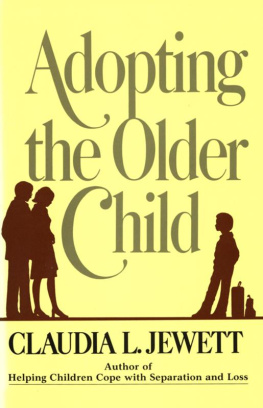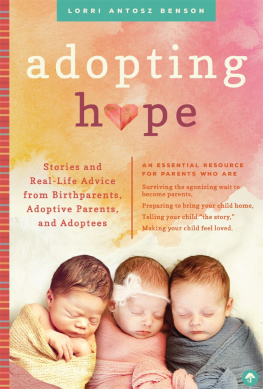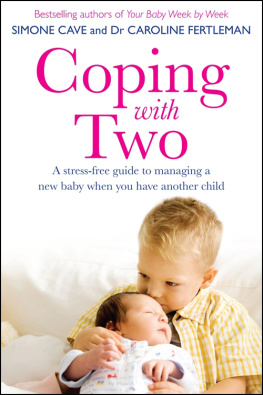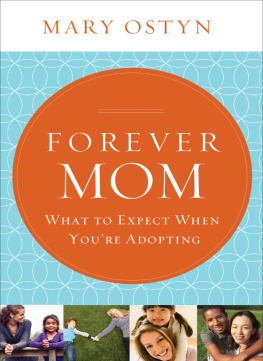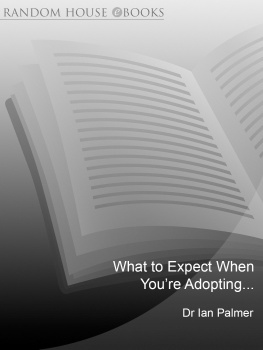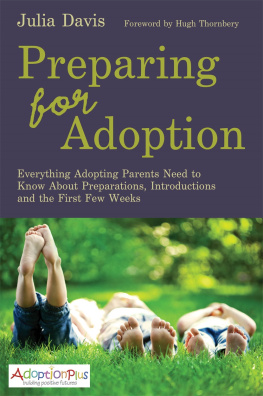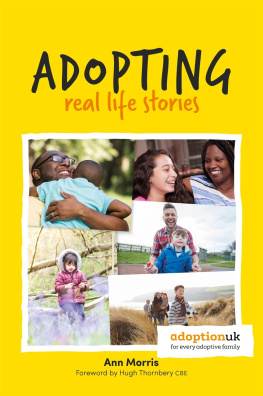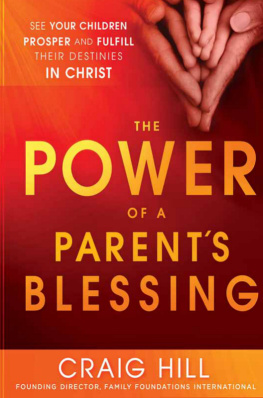Claudia Jarrett - Adopting the Older Child
Here you can read online Claudia Jarrett - Adopting the Older Child full text of the book (entire story) in english for free. Download pdf and epub, get meaning, cover and reviews about this ebook. year: 1978, publisher: Harvard Common Press, genre: Children. Description of the work, (preface) as well as reviews are available. Best literature library LitArk.com created for fans of good reading and offers a wide selection of genres:
Romance novel
Science fiction
Adventure
Detective
Science
History
Home and family
Prose
Art
Politics
Computer
Non-fiction
Religion
Business
Children
Humor
Choose a favorite category and find really read worthwhile books. Enjoy immersion in the world of imagination, feel the emotions of the characters or learn something new for yourself, make an fascinating discovery.
- Book:Adopting the Older Child
- Author:
- Publisher:Harvard Common Press
- Genre:
- Year:1978
- Rating:5 / 5
- Favourites:Add to favourites
- Your mark:
- 100
- 1
- 2
- 3
- 4
- 5
Adopting the Older Child: summary, description and annotation
We offer to read an annotation, description, summary or preface (depends on what the author of the book "Adopting the Older Child" wrote himself). If you haven't found the necessary information about the book — write in the comments, we will try to find it.
The practical classic on adopting an older child.
Adopting the Older Child — read online for free the complete book (whole text) full work
Below is the text of the book, divided by pages. System saving the place of the last page read, allows you to conveniently read the book "Adopting the Older Child" online for free, without having to search again every time where you left off. Put a bookmark, and you can go to the page where you finished reading at any time.
Font size:
Interval:
Bookmark:
The Harvard Common Press
535 Albany Street
Boston, Massachusetts 02118
1978 by The Harvard Common Press
All rights reserved. No part of this publication may be reproduced or transmitted in any form or by any means, electronic or mechanical, including photocopy, recording, or any information storage or retrieval system, without permission in writing from the publisher.
Printed in the United States of America.
Library of Congress Cataloging in Publication Data
Jewett, Claudia L. 1939
Adopting the older child.
Bibliography: p.
Includes index.
1. AdoptionUnited States. 2. Children, AdoptedUnited StatesCase studies. I. Title.
HV675.J48 362.734 77-26973
ISBN 0-916782-08-5
ISBN 0-916782-09-3 pbk.
Shel Silversteins poem from Where the Sidewalk Ends, 1974 by Shel Silverstein, is reprinted by permission of Harper and Row Publishers, Inc.
Cover design by Paul Bacon
Paperback edition published May 1979
20 19 18 17 16 15 14 13
To my husband, Dave,
and to our children :
Larry, Sally, Josh, Mary,
Matt, Helena, Megan,
Rachel, James, and Kristen
Some years ago, my husband Dave and I set about on a great adventure. We decided to fulfill our dream of having a large family by adding to our three biological children some of the children who waited, the older children in need of parents. We didnt adopt out of pity, although compassion was there; we adopted because we deeply wanted a larger family and we felt that this was a good way to go about it. We didnt see adoption as a cause, although social consciousness was there; we adopted because we really like to be parents, and because we felt there was no need to reproduce ourselves again. We didnt adopt because we are noble, unusual people; we adopted in spite of our shortcomings, because we wanted each of the children who came to join us.
Through the problems we encountered, we became better problem solvers and more competent people. Through the experiences we shared with our children, we grew to be wiser and to know ourselves better. Through the excitements and the discouragements we lived with as we became a family, we became more compassionate. Through being stretched, we grew.
In the process, the size of our dream and the risks we allowed ourselves to take also grew. We dont know what the eventual outcome for all of us will be, but the daily living is good, rich, and full. It is better than we could have ever guessed it might be.
Over these years, my own experience as an adoptive parent of older children, coupled with my professional training in family counseling, has put me in the position of closely sharing this particular kind of adoption experience with a great many other families. I have worked for some time with placement agencies and social workers as they tried to find the best ways to help build families through older child adoption. And I have known a good number of children who needed families, and have felt their confusions, their loneliness, their pain.
This book grew out of these experiences. It tells the stories of five particular children of differing needs and ages and of the individual families who adopt them. None of these stories reflects any one child I have known, nor represents any particular family I have worked with. Rather these stories tell the common feelings, concerns, and problems of many families and of the older children they have adopted. Although the characters are fictional, their experiences and the ways they work out their adoptions are not.
These families are unusually fortunate in the social worker with whom they share their adoption experiences. She works in a state where a unique commitment has been made by legislators to provide adequate funds for agency staffing, training, and administration so that children can be provided with outstanding services. She is, therefore, able to do her job in ideal circumstances, unhampered by the time conflicts and the unmanageable caseloads that force most workers to perform under the pressure of a crisis-to-crisis schedule. Although her sensitivity, thoroughness, and professional training make her remarkable today, she is not atypical of the quality of personnel developed in those very few programs that adequately prepare workers and provide them the opportunity to do the kind of job that is needed. There is hope that in the future concerned people will join to demand realistic funding so that workers can better go about placing children and so that more children and families will receive the services represented in this book.
C.L.J.
Harvard, Massachusetts
September 1977
While you are reading this there are between 100,000 and 120,000 children in this country waiting for families of their own. Cut loose from their original families, never to return, adoption may be their only chance for the love, guidance, and concern that all children need in order to grow into well-adjusted adultsable to like themselves, love others, build strong marriages, and raise healthy children of their own. And yet they wait, each passing year making their chances for a permanent family slimmer. Rejected, neglected, often moving time and time againthey need a place to belong.
These children need a social welfare system to go to bat for themto end the red tape that keeps them in limbo without a tailored plan for their survival; to provide monies to staff offices adequately so that parents can be recruited, homes studied, children placed. Each of these children needs a dedicated social worker to translate him or her from another impersonal case study into a living, breathing child. Each needs a family where the child counts, is valued, and can develop according to his or her potential. Each of these children has a story worth telling.
If all these stories of past separations, losses, and adjustments could be gathered together, it would take a large file room to house them. One could randomly open any of these master file drawers, flip through its contents, and arbitrarily pick out four of the many manila folders withinselecting one fat, dog-eared folder; one skimpy, almost untouched and easily overlooked folder; and two medium-sized folders. These files would contain few surprises to the worker or the parent with some experience in older child adoption. For others, to spread them on a table and settle down to read what lies within them is the best way to understand the children who wait.
Clipped to the inside cover of the largest, well-handled file is a color snapshot of an alert black youngster with expressive brown eyes and a slight frown. He has medium-brown skin and a full, stylish Afro. Something about this young man is both attractive and a little challenging. The picture makes the sketchy dictated record more real, but it does not show how easily this teenager makes friends, how skillfully he plays soccer and street hockey, how enthusiastically he fills spare time listening to the latest rock music and avoids his current situation by dreaming about playing a guitar in his own band.
According to the recorded information, Danny spent his early years with parents from whom he received little care and less attention. Both of his parents had serious drinking problems; as a result, Dannys father was often unemployed. When Danny was eight a complaint was lodged against his parents by the school, and he was found to be both malnourished and severely neglected. Danny was removed from his family and placed in a foster home by the childrens protective agency. Although attempts were made to aid his birth parents, conditions did not show much change.
The next few entries show that Danny seemed to get along with the foster family. But after two years his foster father was transferred to another state; Danny was not included in the family plans. His second foster family had just begun to seem comfortable to Danny when his foster mother broke her hip and Danny had to move again.
Next pageFont size:
Interval:
Bookmark:
Similar books «Adopting the Older Child»
Look at similar books to Adopting the Older Child. We have selected literature similar in name and meaning in the hope of providing readers with more options to find new, interesting, not yet read works.
Discussion, reviews of the book Adopting the Older Child and just readers' own opinions. Leave your comments, write what you think about the work, its meaning or the main characters. Specify what exactly you liked and what you didn't like, and why you think so.

